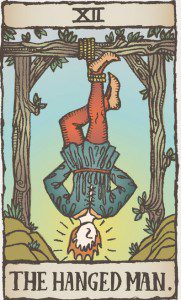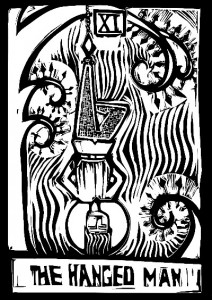
Our ritual focused on the themes of sacrifice, surrender, and submission that arise when many writers contemplate the Hanged One. These are not words that always sit comfortably on me. The last two especially are not states that I happily inhabit. I’m a strong-willed human being with the right of self-determination, after all. That’s part of how I came to Paganism generally, and UU Paganism specifically.
My Paganism involves making my own decisions about my life rather than following dogma or submitting to the will of the church. It involves critical thinking and the ability to act on my conclusions with actions that don’t always line up with the mainstream way of being. I think this is not uncommon among Pagans. We act up. We don’t fall in line, even with each other. We argue with our own gods. So submission and surrender, those are not the sort of spiritual experiences I’m usually looking for.
Sacrifice, though, I can work with. As a member of a Pagan group that is open to the public, I get lots of opportunities to talk about sacrifice, even with other Pagans and spiritual seekers, because it turns out that “do you guys sacrifice animals?” is still a burning question on people’s minds about Paganism. For anyone wondering, I do not sacrifice animals; I do, however, offer up a long list of things tangible and intangible, in service to the gods: time, work, flowers, food, drink, study, art, and so on and so forth.
These are the things I set aside for the gods, things I dedicate to them either because I want to be in the sort of relationship with the gods where we trade gifts and favors, or because in a neo-Platonist way I want to elevate my soul and bring it into harmony with a particular deity. Or because I’m a practical pagan, sometimes I sacrifice things, especially work or effort, because the act of dedicating that effort, making it holy, changes my experience of the effort itself, often making it more palatable in some way or another. So I’m alright with sacrifice.

Submission, though? Surrender? Not so much. And yet… I’ve been thinking about it since the ritual, and perhaps one useful place for submission is in the idea of submitting to your own will, your own prior choices. Lately I’ve been reading Better than Before, Gretchen Rubin’s work on habits. One of the ideas that Rubin puts forth is that sticking to a good habit is front-loading your free will in a matter. You decide once to do a thing (or not do a thing), and while you might struggle with the thing for a while, if you keep reminding yourself that you already made up your mind on the issue, eventually the habit becomes automatic. In this model you don’t have to choose on a daily basis to brush your teeth or go to the gym or whatever it is, because you’ve already chosen once to do it every day and you continue to respect that choice, until maybe some day you’ll choose something different. This is a sort of submission that looks a lot like self-mastery. I can work with that.
More specifically, within Paganism there is an idea this reminds me of, which is that the eternal soul chooses before each birth what sort of life it will lead and what sort of lessons it will learn, and then immediately before incarnation it forgets all that it has chosen so that it can experience it all moment by moment and do the work it needs to do. Myself, I do not believe that we choose our lives in every particular before we are born, though it’s been a popular theory from the ancient Greeks all the way to the modern age.
It’s an interesting idea though, and there are times where the you-of-the-moment might do well to submit to the will of the eternal-you. And this is one interpretation of the Hanged One card, that there is some spirit or spark which voluntarily descends into incarnation in order to learn. Odin goes voluntarily to the tree, Christ to the cross, Inanna to the underworld, and the witch into the initiatory circle, all answering yes to the question of willingness to suffer in order to learn.

If a thing is true, no amount of my arguing with it will make it untrue. If I am ill, I can take action to help myself heal, or I can adapt to my illness, but not until I give up arguing that I am not ill. I have to accept that I am ill in order to take useful action about it. If society is not just, no amount of pretending that the injustice doesn’t exist will make anything better for anyone. Giving up an argument with an unpleasant reality isn’t any fun, but it’s a necessary prerequisite to doing something useful, to actually creating a change.
So what does the Hanged One offer us? It’s impossible to say with certainty, but the peaceful expression hints that this is no punishment, no tortment for torment’s sake. The Hanged One calls us to examine our assumptions, our certainties about the world we occupy. Surrendering comforting pretense and illusion may be the first step to learning where we truly need to be going. Our own journey must be lived, not merely read and recited and reblogged.

















